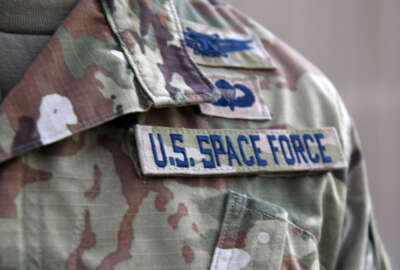NGA to launch $700M data labeling competition
NGA is also launching a new initiative to set accreditation standards for any AI models that supports the agency's geospatial intelligence analysis.
The National Geospatial-Intelligence Agency plans to release a major request for proposals for data labeling services this month.
NGA Director Vice Adm. Frank Whitworth said his agency’s data labeling RFP would be the largest effort across the U.S. government, with an expected ceiling of more than $700 million. The goal is to help NGA categorize and label geospatial intelligence data, such as satellite imagery, so the agency scales its use of artificial intelligence.
“This represents a significant investment in computer vision, machine learning, and AI,” Whitworth said. “NGA will engage with commercial counterparts to navigate the challenges posed by increasing levels of GEOINT data, together, we will ensure delivery of timely, relevant and AI-enabled GEOINT to our customers, partners and allies.
NGA is also starting a new initiative to set standards for AI models. The pilot program is called Accreditations for GEOINT AI Models, or AGAIM.
“The idea here, just to simplify it, is to ensure that anyone who touches our code, that addresses GEOINT AI, understands that we’re staying principled,” Whitworth said during an Aug. 30 Defense Writers Group breakfast in Washington.
As a combat support agency for the Defense Department, NGA’s analysis often supports military intelligence and targeting. Whitworth said setting accreditation standards will help ensure NGA is following the laws of armed conflict in its use of AI, especially those that require distinction between military and civilian objects.
“We want to make sure that no one fears that there’s going to be some sort of singularity where code takes over and makes decisions,” Whitworth said.
NGA’s approach will feature evaluating models based on their level of maturity, Whitworth said.
“We’re not addressing autonomy necessarily,” he said. “We’re addressing just the quality of the model.”
While NGA is also turning to commercial industry for more GEOINT analysis, Whitworth didn’t say whether the agency would require companies to adopt the AI standards. But he said accredited models will be required for NGA systems.
“Whether commercial adopts this independently, that remains to be seen. I’m not going to say anything about whether we would mandate that sort of thing,” Whitworth said. “However, if it’s going to be on a DoD system or certainly a GEOINT system being used for GEOINT levels of certainty, whether it’s confirmed, probable, type of call, we’re going to expect of ourselves in the National Geospatial Intelligence Agency and the [National System for Geospatial Intelligence], we’re going to expect to see that it’s with an accredited model.”
NGA is looking to expand its use of AI and machine learning to help grapple with the rapidly growing availability of commercial satellite imagery and other GEOINT data. The agency took over administration of the Pentagon’s AI pathfinder, Project Maven, in 2022. Now just referred to as “Maven,” it’s a program-of-record at NGA.
Whitworth also pointed to a new AI training program, called “GEOINT Responsible AI Training” or “GREAT.” The agency launched its first pilot classes this past spring. Whitworth said the plan is for classes to be available to any agency working on GEOINT.
“GREAT is tailored to developer or user specific challenges across the AI life cycle, and everyone taking the certification will be asked to sign a final pledge to develop or use AI responsibly,” he said.
Copyright © 2024 Federal News Network. All rights reserved. This website is not intended for users located within the European Economic Area.
Follow @jdoubledayWFED






